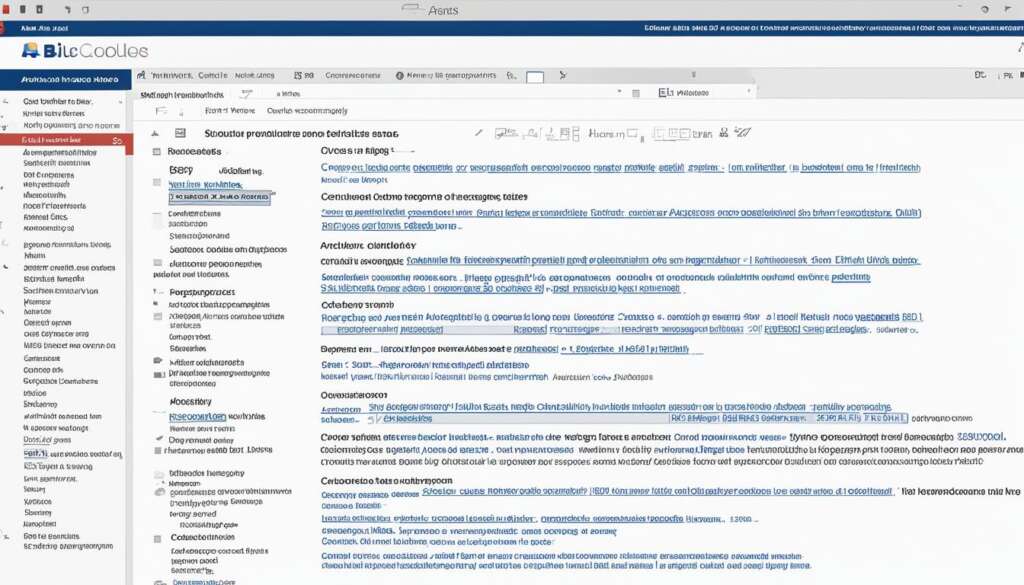Table of Contents
Email archiving is a vital aspect of modern business communication, where emails need to be retained and preserved for various compliance and retrieval purposes. An email archive is a repository that captures and stores all incoming and outgoing emails, maintaining a complete record of electronic communication.
The need for email archiving arises from various regulatory requirements concerning retention and accessibility of electronic communication. For instance, financial institutions are required to retain all email communication for a specified period under regulations such as the Financial Conduct Authority’s (FCA) SYSC 10A rules.
Email archives also play a critical role in enabling efficient retrieval of communication records, helping businesses fulfil various discovery requests, audit inquiries, and legal investigations.
Key Takeaways
- Email archiving is essential for regulatory compliance and efficient retrieval of communication records.
- Email archives capture and store all incoming and outgoing emails in a repository.
- Regulations such as the FCA’s SYSC 10A rules require financial institutions to retain all email communication for a specified period.
- Email archives facilitate various discovery requests, audit inquiries, and legal investigations.
- Reliable email archiving solutions offer various benefits, including enhanced data protection, streamlined operations, and peace of mind.
The Purpose and Benefits of Email Archiving
Email archiving has become an essential process for modern businesses. It helps in meeting compliance regulations, protecting important data, and mitigating legal risks. In this section, we’ll delve into the purpose of email archiving and its numerous benefits.
Purpose of Email Archiving
The main purpose of email archiving is to ensure that crucial business information contained in emails is preserved and accessible for regulatory and legal purposes. With an email archiving system in place, businesses can store their emails systematically and retrieve them in an organized manner, ensuring that the information is traceable and can be easily accessed. This makes compliance and litigation processes less complicated, ensuring that the business’s reputation is not put at risk.
Benefits of Email Archiving
Email archiving brings several benefits to businesses. Here are some of the key benefits:
| Benefit | Description |
|---|---|
| Data Protection | Having an email archive helps businesses protect their data from loss due to system crashes, cyber-attacks, or accidental deletion. This ensures that important emails and attachments are preserved. |
| Storage Optimization | Email archiving systems offload emails from mail servers, freeing up storage space and optimizing server performance. This helps in reducing storage costs and improving email server performance. |
| Efficient Retrieval of Messages | Email archives provide a quick and easy way to find important emails. Employees can search for specific emails using criteria such as sender, recipient, or date. This improves productivity, reduces search time, and enables easy retrieval of important messages. |
Implementing an email archiving solution can bring long-term benefits to businesses, including enhanced compliance, streamlined operations, and a better understanding of email communication. By archiving emails, businesses can focus on more important tasks without feeling overwhelmed by email management.
How Email Archiving Works
Email archiving is a process of preserving and storing email messages for long-term retention. In this section, we will provide an in-depth overview of how email archiving functions and its underlying mechanisms.
Capturing Emails
The capture process involves copying and transferring emails from the mailbox to the email archive. When an email is sent or received, it is automatically copied and sent to the email archive. Capturing emails ensures that all email communication is saved for future reference.
Indexing Emails
Indexing involves organizing email messages in a logical, structured format, making it easier to search for and retrieve specific emails from the archive. Email indexing typically involves scanning the message and extracting the sender, recipient, subject, and body. The extracted data is stored in a specialized database that allows for efficient searching and retrieval.
Storing Emails
Once captured and indexed, emails are stored in the email archive. Depending on the archiving mechanism (on-premises or cloud-based), the archive may be stored locally or on third-party servers in a secure data center. All stored emails are encrypted to ensure data protection.
On-Premises vs. Cloud-Based Archiving
Email archiving can be deployed in two primary ways: on-premises or cloud-based. On-premises archiving involves installing an archiving solution on the organization’s server or storage device. Cloud-based archiving, on the other hand, involves outsourcing email archiving to a third-party provider who stores and manages the archive on their servers.
| On-Premises Archiving | Cloud-Based Archiving |
|---|---|
| Offers greater control over data | Outsourcing email archiving to a reliable third-party provider can reduce IT overheads and free up resources for other business-critical tasks. |
| Requires initial setup and ongoing maintenance costs | Quick and easy to deploy |
| Storage capacity can be easily increased by adding more hard drives | No hardware or software installation is required |
Overall, email archiving is an essential tool for businesses that require accurate and secure records of email communication. Capturing, indexing, and storing emails in an archive allows for efficient searching and retrieval of specific messages, compliance with legal and regulatory requirements, and optimal storage optimization.
Conclusion
In conclusion, email archiving plays a critical role in safeguarding business communication for compliance and retrieval purposes. By ensuring the preservation and accessibility of important emails, businesses can effectively address legal and regulatory requirements whilst maintaining a secure and organised digital record. Adopting a reliable email archiving solution can bring numerous benefits, including enhanced data protection, streamlined operations, and peace of mind knowing that critical information is readily available when needed.
It’s important for businesses to consider the purpose and benefits of email archiving and how it works. Understanding the mechanisms and processes involved in capturing, indexing, and storing emails in an archive is crucial for effective email management. Businesses should carefully consider the different approaches to email archiving, such as on-premises solutions and cloud-based services, and weigh their respective benefits and considerations.
Ultimately, the adoption of a robust email archiving solution can have a positive impact on a business’s operations, data protection, and compliance posture. As businesses increasingly rely on electronic communication for critical operations, email archiving will become even more important in ensuring the safeguarding and accessibility of important information.
FAQ
What is email archiving?
Email archiving is the process of capturing, indexing, and storing emails in a secure and accessible archive. It ensures that important business communication is preserved for compliance and retrieval purposes.
Why is email archiving important?
Email archiving is important because it helps businesses meet regulatory compliance requirements and mitigates legal risks. It ensures that crucial information can be easily accessed and retrieved when needed.
What are the benefits of email archiving?
Email archiving offers several benefits. It helps in data protection, as important emails are securely stored and protected from loss or unauthorized access. It also optimizes storage space by reducing the burden on email servers. Additionally, it enables efficient retrieval of important messages, saving time and ensuring business continuity.
How does email archiving work?
Email archiving works by capturing and indexing incoming and outgoing emails. These emails are then stored in a secure archive, which can be on-premises or cloud-based. The archive allows for easy search and retrieval of emails, ensuring that important information can be accessed quickly when needed.
What are the different approaches to email archiving?
There are different approaches to email archiving. One option is an on-premises solution, where the email archive is hosted within the organization’s infrastructure. Another option is a cloud-based service, where the archive is managed by a third-party provider. Each approach has its benefits and considerations, such as control, scalability, and cost.
How can email archiving benefit businesses?
Email archiving can benefit businesses in multiple ways. It ensures compliance with legal and regulatory requirements, reducing the risk of penalties and legal disputes. It also improves data protection and storage optimization. Additionally, it provides peace of mind knowing that critical information is readily available and easily retrievable when needed.













